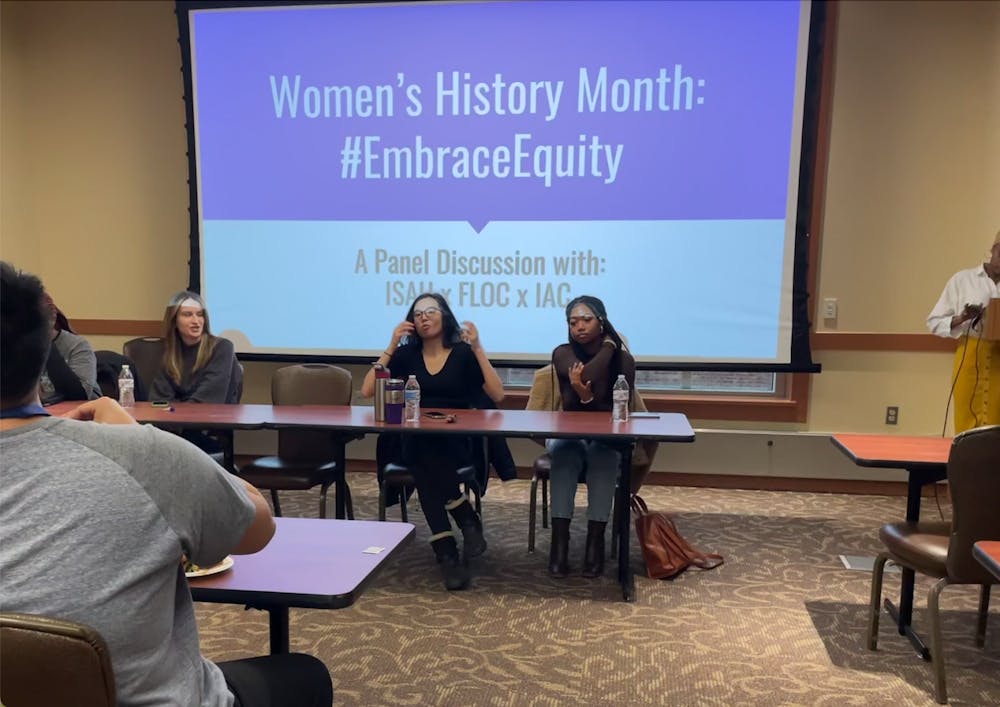Female leaders from International Students at Hopkins (ISAH), Female Leaders of Color (FLOC) and Inter-Asian Council (IAC) partnered to hold the Women’s History Month discussion panel on March 31. Led by ISAH Undergraduate Co-leads Shajae Pinnock and Betul Celiker, the discussion centered on themes of equity and intersectional identities and how these are expressed both in Hopkins and around the world.
In addition to the ISAH student leaders, the panel included President of FLOC Indira Summerville, Vice-President of FLOC Cierra Gladden and President of IAC Isabel Veloso.
In an interview with The News-Letter, Pinnock explained what the panel discussion intended to accomplish.
“It's a call to action [for participants] to try and see what lapses of equity are in their lives and not just in Hopkins,“ she said. “Hopefully, it inspires them to think about their communities and where they can strive to make things a bit more equitable.”
To begin the discussion, Pinnock highlighted the importance of distinguishing between equity and equality, explaining that providing resources based on the diverse and specific needs of different groups is representative of equitable practices. She asked panelists about the lapses in equity they’ve seen or experienced.
Gladden stated that while Hopkins is considered a progressive campus, the institution’s message contrasts the reality of its hiring choices.
“There have been strides to address differences in financial background and geographical background,” Gladden said. “But the makeup of faculty here doesn't reflect the message that higher education wants to send to students — that we can all succeed — because the majority of faculty does not reflect the demographic of the student body. It's discouraging for a Black woman in STEM or in film or any creative area when you don’t have professors that are Black women of color.”
Echoing these themes, Veloso discussed the Board of Trustees at Hopkins. She explained how they’re decision-makers for the student body without being representative of the community, touching on issues of accountability and transparency.
“At the end of the day, people who make decisions about the school are usually not even living in Baltimore. That’s something that needs to change,” she said.
In regard to solutions that can address disparities in equity, Summerville explored accessibility through the lens of lecture recordings, emphasizing the importance of continuing to offer virtual alternatives to physical classes.
Contributing an international student’s perspective, Celiker discussed the practicality of recorded lectures for both students and professors.
“This reminded me of my freshman year when I wasn't used to this amount of English in class, especially with the science language. I would think, ‘People are getting it so fast and I have to go home and review it to understand,’” she said. “When people started recording lectures, it was so helpful.”
Veloso delineated the different forms of support she hopes IAC and other organizations can offer to students.
“We don’t necessarily have women-specific events, although I think that it's something that we should do in the future, given the general stereotypes surrounding [Asian Pacific Islander Desi American (APIDA)] women and fetishization,“ she said. “Educating people about APIDA culture and then allowing women to express and be fully themselves in front of other people is a very powerful way of supporting them.”
In addition to expounding on the changes they would like to see on campus, panelists also acknowledged the benefit of programs currently in place. Gladden listed the Gender Affirming Closet and Food Pantry as resources that provide holistic care for students.
In an interview with The News-Letter, senior Yordanos Degefe remarked on the importance of information about support programs being available to students.
“I really loved that they shared some of the resources that Hopkins provides that I was not aware of,“ she said. “That was a key aspect of this [panel], but they also highlighted there’s a lot of work to be done and more that Hopkins has to do to support students here.”
Pinnock contributed her own international experience, emphasizing that while the challenges in some countries might be considered more severe than those in others, all forms of inequity are valid and must be addressed with appropriate solutions.
“I was born and raised in Jamaica. We have lots of women in leadership positions, and it's a very matriarchal country in many ways; home life is very woman-led. [There’s] a sense that ‘you shouldn't have anything to worry about because you’re in a country where women are in leadership positions,’” she said. “At the same time, we have high rates of femicide and domestic partner violence.”
In an interview with The News-Letter, Linh Pham, a freshman attending the event, discussed what she took away from the event.
“While we’re still a ways away from reaching equity, it’s really interesting to see how many of the panelists’ moms have helped pave the way for equity,” she said. “In a way, the women in the panel today are paving the way for us as underclassmen to reach equity and to recognize and acknowledge the things that need to be worked on.”
Editor’s Note: The article was editor to clarify comments on the Board of Trustees.





